Artist Jean-Luc Moulène’s newest work is on view in an exhibition titled Clearly at Miguel Abreu Gallery in New York. Though extremely diverse, Moulène’s practice shares a risk-taking in experimentation, a play of material contradiction, and a sense that time has stopped at a moment of critical tension. Utilizing blown glass, carved foam, found objects, and cast bronze, the exhibition is a cross-fertilization of new ideas throughout two locations.
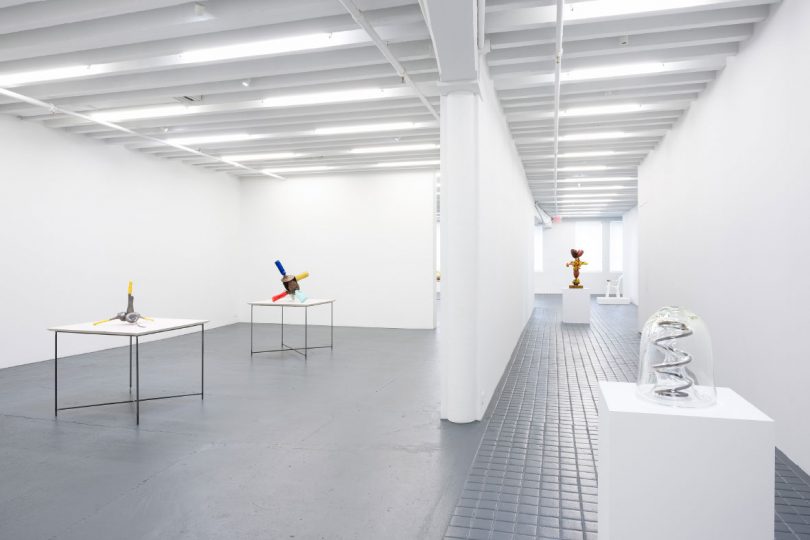
Jean-Luc Moulène “Clearly” at Miguel Abreu Gallery, 2022
Every Jean-Luc Moulène exhibition I’ve seen benefits immensely from a visit in person, and “Clearly” is no exception. The presentation of each object encourages a 360-degree viewing experience while connecting themes with other works within your line of sight. But if you’re unable to visit, the second-best experience is to click through all 16 works on Miguel Abreu Gallery’s website after this brief introduction to get the full sense of the total exhibition experience.
That said, here are my 5 favorite objects in Jean-Luc Moulène’s “Clearly” and why:
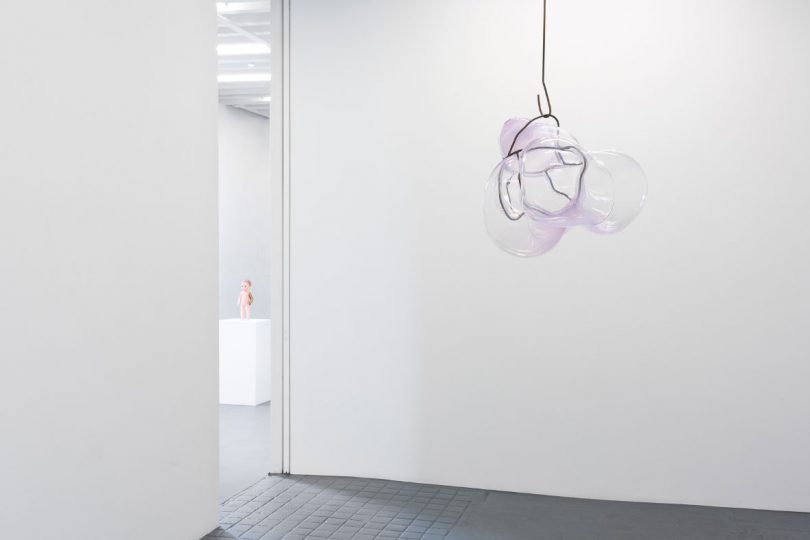
Jean-Luc Moulène “Clearly” at Miguel Abreu Gallery, 2022
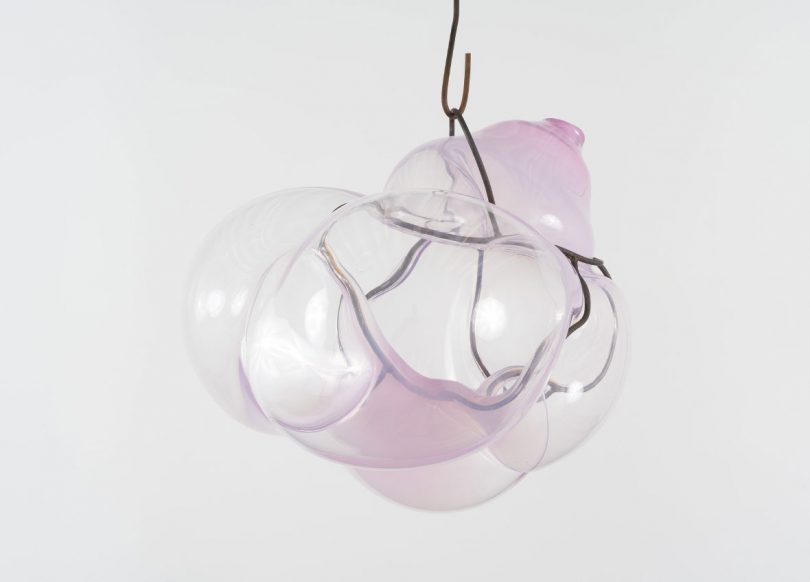
Poudrée, 2021
Poudrée is a perfectly balanced contradiction. Glass is blown inside a steel form until sections bubble out and reform outside the cage, like two soap bubbles connecting in mid-air. At the thinnest points, the glass nearly disappears into the air with a sense that it could burst at any moment. The work highlights three common hallmarks in Jean-Luc’s work: A sense of daring risk through fearless limit-pushing in material experimentation, a magical collaboration with “chance,” and a feeling that you’re looking at a moving object frozen in time. None of these works actually move, but you get the sense that you’re “watching” them more than “looking at” them.
![Front view of Ressort Flous [Fuzzy Spring] (Le Buisson)](https://static.artisshare.com/wp-content/uploads/2022/10/20221020204358710.jpg)
Ressort Flous [Fuzzy Spring] (Le Buisson), 2022
![back view of Ressort Flous [Fuzzy Spring] (Le Buisson)](https://static.artisshare.com/wp-content/uploads/2022/10/20221020204358321.jpg)
Ressort Flous [Fuzzy Spring] (Le Buisson), 2022
Ressort Flous [Fuzzy Spring] (Le Buisson) is one of two “fuzzy” objects in the exhibition… and neither is soft. The word “fuzzy” refers to a strange ballooning expansion of a common object. My own interpretation is that this could be an attempt to apply a Photoshop-like “blur” to a solid metal object – a physical impossibility that produces a new form of sculptural abstraction. In “Fuzzy Spring” for example, a silver-patina’ed bronze spring gradually expands across its length until the individual coils envelope themselves. Presented horizontally, it feels both precarious on the pedestal while allowing the viewer to look inside and explore the distortion from the inside as well.
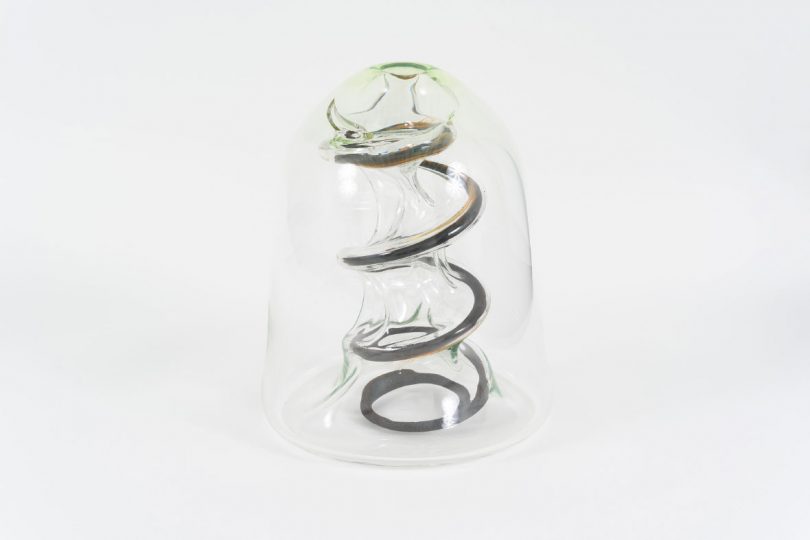
Uranium Spring 1 (Marseille), 2022
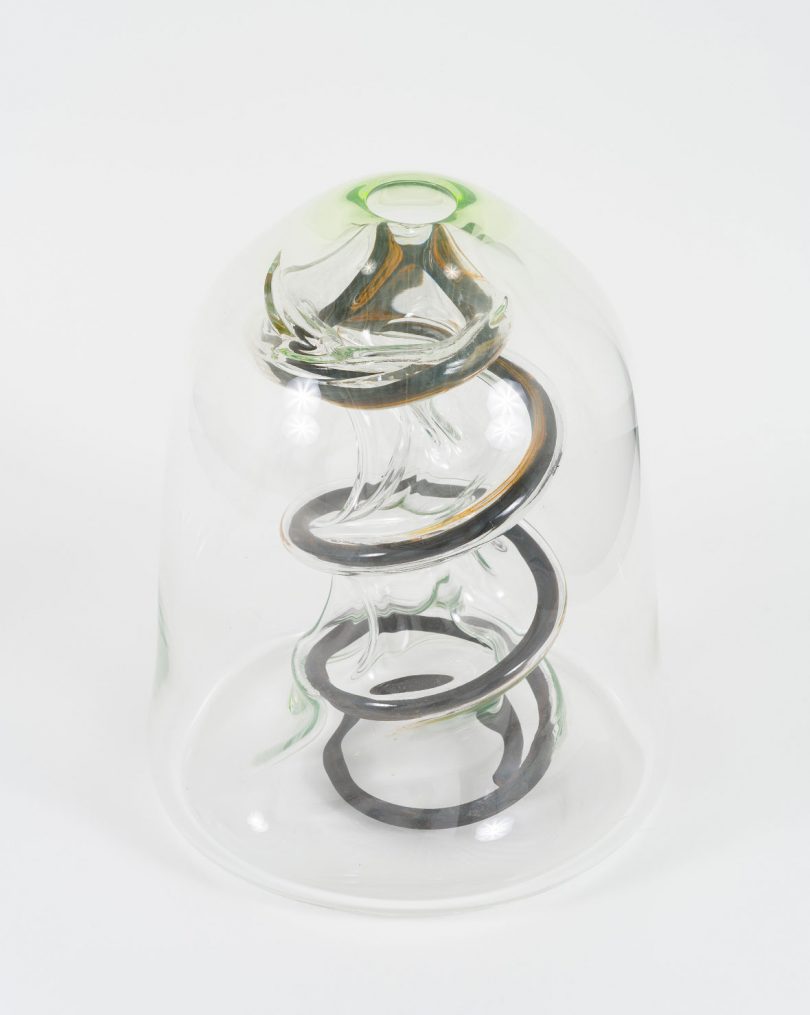
Uranium Spring 1 (Marseille), 2022
Uranium Spring 1 (Marseille) relates to the fuzzy spring, but also presents itself as an exact opposite to the hanging La Poudrée (the first sculpture on the list). While La Poudrée pushes glass against and beyond a metal form, this work pushes metal into a glass bubble that results in a vacuum-like clinging to the spring. The title references the use of uranium oxide in the glass that lends a subtle green glow – a perfect contrast to the areas of orange rust.
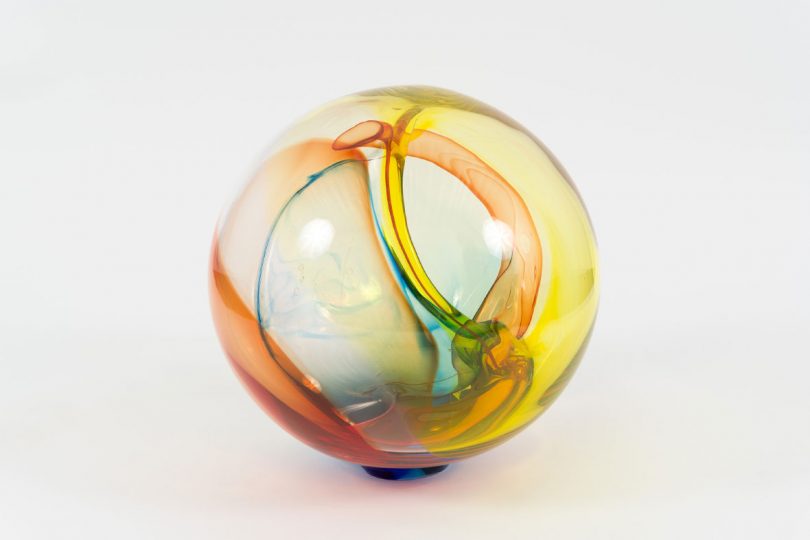
Quelque Chose Blanc (Clover Knot – Three Colors) (Marseille), 2022
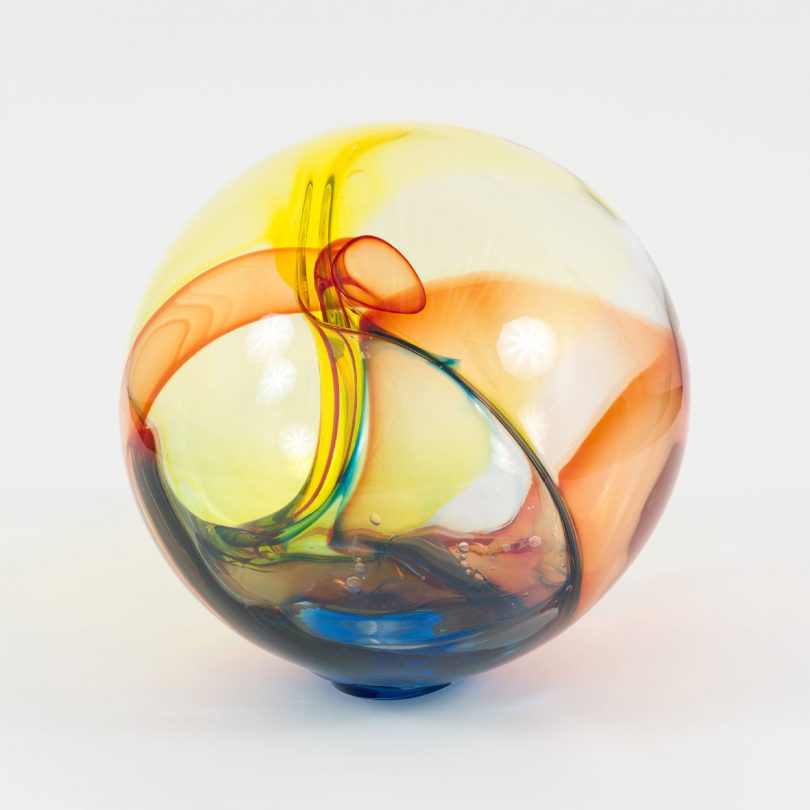
Quelque Chose Blanc (Clover Knot – Three Colors) (Marseille), 2022
The colorful Quelque Chose Blanc (Clover Knot – Three Colors) (Marseille) is a thin blown glass sphere that holds a strange asymmetrical interior, achieving another unbelievable opposition using a single material. The complexity of the object is the result of a process that involves 3 people tying a blown-glass form into a knot and inflating it, precisely controlling heat and air. The work feels like it’s on the edge of material failure while the interior prompts every viewer to continuously circle in an effort to understand.
![Full view of Standard et Ornement [Standard and Ornament] (Le Buisson)](https://static.artisshare.com/wp-content/uploads/2022/10/20221020204358757.jpg)
Standard et Ornement [Standard and Ornament] (Le Buisson), 2021
![Detail of bronze section on Standard et Ornement [Standard and Ornament] (Le Buisson)](https://static.artisshare.com/wp-content/uploads/2022/10/20221020204358816.jpg)
Standard et Ornement [Standard and Ornament] (Le Buisson), 2021
In the back of the gallery, a pristine white mass-produced plastic chair holds a chunk of bronze on the edge of one armrest. With this small addition, Standard et Ornement [Standard and Ornament] (Le Buisson) successfully holds the full presence of the artist himself. The imprint of the hand is not at rest – the heal of the hand smears and the finger impressions imply a certain pulling motion, as if the artist is beginning to sit, stand, or attempting to push the armrest forward. Either way, the ghost that is sitting in this chair is moving. Standard et Ornement is collision of “low” and “high” materials, presence vs. absence, human-made vs. mass-produced, and motion vs. stillness. I stayed for longer than I planned and walked away with a sense that Jean-Luc Moulène takes his experiments, questions, and perfectionism incredibly seriously, but also injects just enough humor to increase my curiosity, wonder, and my own questions.
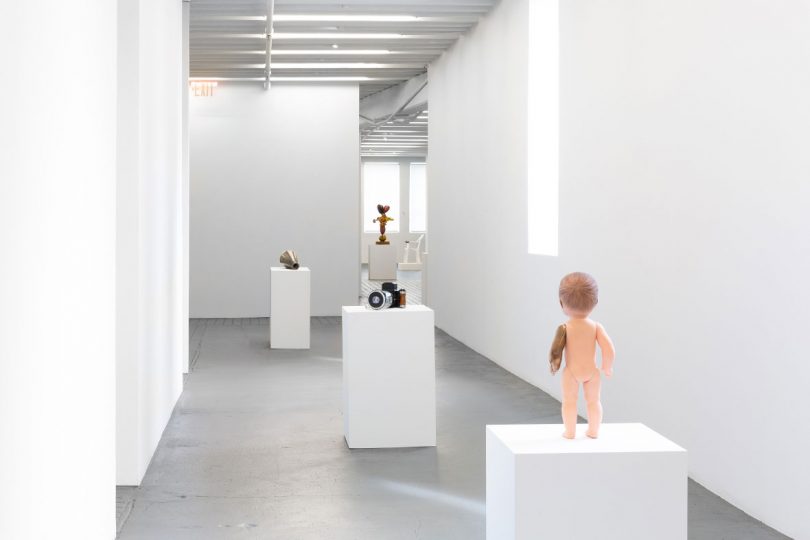
Jean-Luc Moulène “Clearly” at Miguel Abreu Gallery, 2022
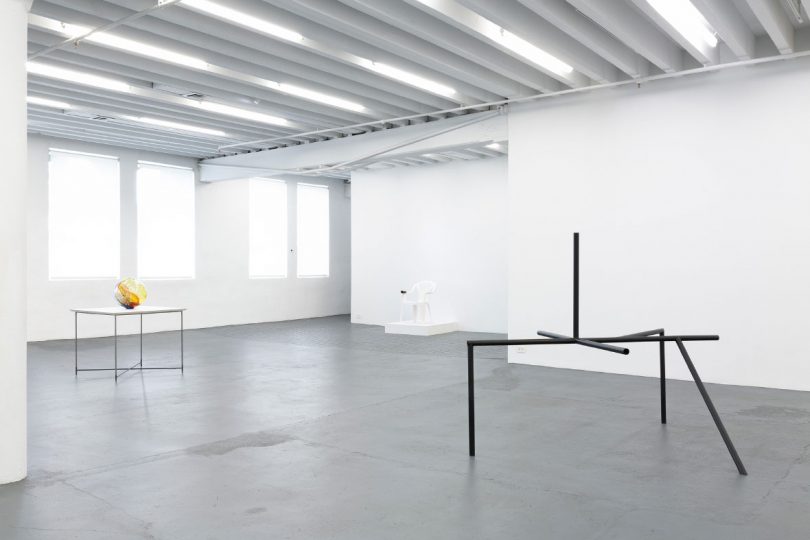
Jean-Luc Moulène “Clearly” at Miguel Abreu Gallery, 2022
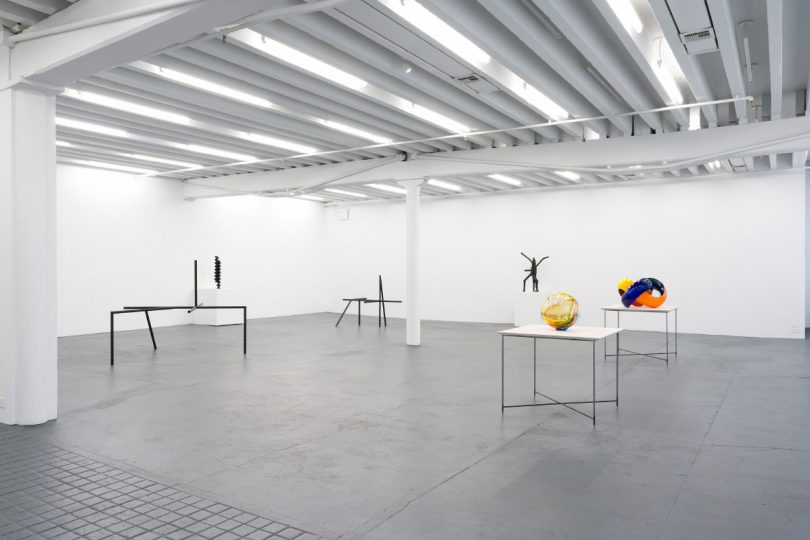
Jean-Luc Moulène “Clearly” at Miguel Abreu Gallery, 2022
Visit if you can, and take a moment to click through all 16 objects on the gallery website to find more “fuzzy” objects, material oppositions, and additional joyous surprises. Clicking on “images” will share the best views, while clicking on “checklist” will give you a paragraph explanation of each object.
What: Jean-Luc Moulène: Clearly
Where: “Clearly” extends across both Miguel Abreu Gallery locations: 88 Eldridge St and 36 Orchard St, New York, NY
When: May 19 – July 1, 2022
All images © Jean-Luc Moulène, Courtesy Miguel Abreu Gallery
Photos: Stephen Faught

David Behringer visits over 200 galleries every month to uncover and share the most exciting contemporary art in New York today. Subscribe to his exclusive weekly newsletter at www.thetwopercent.com and learn about his private gallery tours. And be sure to check out his YouTube.
You can follow David Behringer on Instagram. Read all of David Behringer’s posts.
